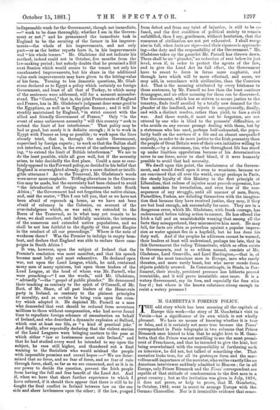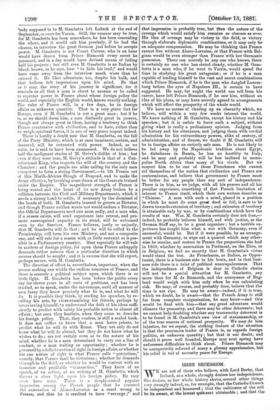M. GAMBETTA'S FOREIGN POLICY.
THE odd story which has been amusing all the capitals of Europe this week—the story of M. Gambetta's visit to Varzin—has a significance of its own which is not wholly pleasant. We have no means of knowing whether it is true- or false, and it is certainly not more true because the Times' correspondent in Paris telegraphs in two columns that Prince- Bismarck once hinted to him that he might hint to M. Gana- betta that the Prince was not unwilling to see the most promi- nent of Frenchmen, and that he intended to give the hint, but being overwhelmed with the responsibility of furthering such an interview, he did not, but talked of something else. That narrative looks true, for all its grotesque form and the mar- vellous self. importance of the narrator, who writes exactly like an American interviewer suddenly admitted to Heaven ; for in all Europe, only Prince Bismarck and the Times' correspondent are capable of that attitude of condescension to the first man in a. great country ; but as the invitation was given in July, 1878, it does not prove, or help to prove, that M. Gambetta, in October, 1881, went in secret to arrange Europe with the German Chancellor. Nor is it irresistible evidence that some- body supposed to be M. Gambetta left Lubeck at the end of September, en route for Varzin. Still, the rumour may be true, for M. Gambetta has been somewhere, he has been concealing the where, and it would suit him precisely, if he had the chance, to interview the great German just before he accepts power. M. Gambetta is not Count Cavour, who in an hour would have drawn from Prince Bismarck every secret he possessed, and in a day would have devised means of foiling half his projects ; but still even M. Gambetta is an Italian by blood, knows, as he says, how "to hide his trail," and would have come away from the interview much wiser than he entered it. He likes adventure, too, despite his bulk, and that balloon left impressions upon his mind. Be that as it may, the story of his journey is significant, for it reminds us all that a man is about to assume or be called to supreme power in France about whose foreign policy the world, and especially the English world, knows exactly nothing. The ruler of France will, in a few days, be in foreign affairs an unknown quantity. That is a very grave fact for Europe, even if M. Gambetta is not a great man ; but if he is, as we should deem him, a man distinctly great in powers, -though not always great in ideas, having a tendency to think France coextensive with civilisation, and to hate, rather than to weigh, spiritual forces, it is one of very grave import indeed.
There is hardly a doubt now that M. Gambetta, on the fall -of the Ferry Ministry, which is at once imminent, certain, and deserved, will be entrusted with power. Indeed, as we write, he is said to have been summoned. We do not believe half the malignant stories of M. Grevy's dislike of him; but even if they were true, M. Grevy's attitude is that of a Con- stitutional King, who respects the will of the country and the Chamber ; and the people are alike calling for the only man competent to form a strong Government,—to lift France out of this North-African Slough of Despond, and to make the Army effective, by breaking sorae dozen of the Generals trained under the Empire. The magnificent strength of France is being wasted and the heart of its new Army broken by a collision between the Civil and Military Departments, which it needs a strong hand to settle, if necessary by the dismissal of the heads of both. M. Gambetta learned to govern as Dictator, and though France neither wants nor would endure a Dictator, the Official Departments need one most sadly, and a man who, if a reason exists, will send experience into retreat, and pro- mote unrecognised capacity in its stead, will be welcomed even by the Services. France believes, justly or unjustly, that M. Gambetta will do that ; and he will be called to the Premiership, will form his own Ministry, and not a composite one, and will rule for a season with as little restraint as is pos- sible in a Parliamentary country. Most especially he will rule in matters of foreign policy, for upon them France unhappily demands rather success than a particular direction in which success should be sought ; and it is success that she will expect, perhaps secure, with M. Gambetta.
The direction of effort is, nevertheless, important, when the person making one wields the endless resources of France, and there is scarcely a political subject upon which there is so little light. M. Gambetta has been before the public every day for eleven years in all sorts of positions, and has been studied, so to speak, under the microscope, until all manner of men fancy they know precisely what he is, and what he will do. It is possible they think, by reading his speeches, by re- calling his acts, by cross-examining his friends, perhaps by interviewing himself, to understand the drift of his ideas suffi- ciently to predict with safety his probable action in almost all affairs ; but even they hesitate, when they come to describe his foreign policy. That, they confess, is still a sealed book. It does not suffice- to know that a man hates priests, to predict what he will do with Rome. They not only do not know what he will do abroad, but they do not know what he wishes to do ; are not certain even as to the nature of his mind, whether he is a man determined to carry out a line of conduct, or a man waiting an opportunity ; whether he is governed by a definite notion of right in foreign affairs, or whether his one notion of right is what France calls "patriotism," namely, that France shall be victorious ; whether he demands triumph in the field, or whether he would be content with an immense and profitable "transaction." They know of no speech, of no action, of no writing of M. Gambetta, which throws a clear light upon his foreign policy. He may even have none. There is a deeply-rooted popular impression among the French people that he resented the annexation of Alsace-Lorraine as a cruel wrong to France, and that he is resolved to have "revenge ;" and
that impression is probably -true, but ' then the nature of the revenge which would satisfy him remains as obscure-as ever. His idea of revenge may be victory in the field, or victory through elaborate diplomatic combinations, or it may only be an adequate compensation. He may be- thinking that France cannot live without Alsace-Lorraine, or that France with Bel- gium would be even stronger than France with her Germanic possession. There can scarcely be any one who knows, there is certainly no one who has stated clearly, whether M. Gam- betta is a man who, if he went to Varzin, would spend the time in studying his great antagonist ; or if he is a man capable of lending himself to the vast and secret combinations which Prince Bismarck, if he is the man who dangled Luxem- burg before the eyes of Napoleon III., is certain to have suggested. He may, for aught the world can tell from his career, have left Prince Bismarck, if he saw him, without an idea of his plans, or may have secretly agreed to arrangements which will affect the prosperity of the whole world.
We have no means of clearing up an obscurity which, we believe, will within a very few weeks interest the world. We know nothing of M. Gambetta, except his history and his speeches ; but it is unfair to leave such a subject, without giving what is really a preliminary opinion. Judging from his history and his utterances, and judging them with cordial admiration for his extraordinary powers, alike of oratory, of administration, and of finesse, we doubt if M. Gambetta will be in foreign affairs an entirely safe man. He is not likely to be led away by the Napoleonic tradition about Egypt, he disbelieves in Russia, he has no hostility to Italy, and he may and probably will be less inclined to mono- polise North Africa than many of his rivals. But we suspect him to be one of those Frenchmen who cannot rid themselves of the notion that civilisation and France are conterminous, and believe that government by France must be better for any people than any sort of independence. There is in him, as we judge, with all his powers and all his peculiar experience, something of that French limitation of interest to France itself, which their own writers describe as "Chinese." A man with such a mind, placed in a position in which he must do some great deed or fail, is sure to be drawn towards extension of territory ; and extension of territory is attainable only by war, or by combinations which 'have the results of war. War, M. Gambetta certainly does not fear,— indeed, he probably believes himself, and with justice, as the German Staff say, to be a great organiser ; but a terrible ex- perience has taught him what a war with Germany, even if successful, would be. But if it were possible, by an arrange- ment with Germany, to wipe out a quarrel which may other- wise be secular, and restore to France the proportions she had in 1869, whether by annexation in Piedmont, on the Ebro, or in Belgium, we feel no security that M. Gambetta's virtue would stand the test. As Frenchman, as Italian, as Oppor- tunist, there is a business side to his brain, and in that busi- ness side there is a taint of political unscrupulousness. That the independence of Belgium is dear to Catholic clerics will not be a special attraction for M. Gambetta, any more than for M. de Bismarck, and the annoyance of Eng- land would weigh with him only when he was calculating risk. He may, of course, and probably does, believe that the time is not ripe. He may be aware—indeed, if it is true, which we doubt, he is aware—that the French Army is still far from complete reorganisation, he may know—and this' would be final with him—that any great adventure would alienate the peasantry, and there may be other deterrents; but we cannot help doubting whether any trustworthy deterrent is to be found in M. Gambetta's own • view of statesmanship, or of the true sources a national prosperity. We may do him injustice, for we repeat, the striking feature of the situation is that the proximate leader of France is, as regards foreign politics, an unknown quantity ; but that is our doubt, and should it prove well founded, Europe may next spring have unforeseen difficulties to think about. Prince Bismarck may be unexpectedly relieved of many a gloomy apprehension, but his relief is not of necessity peace for Europe.



































 Previous page
Previous page